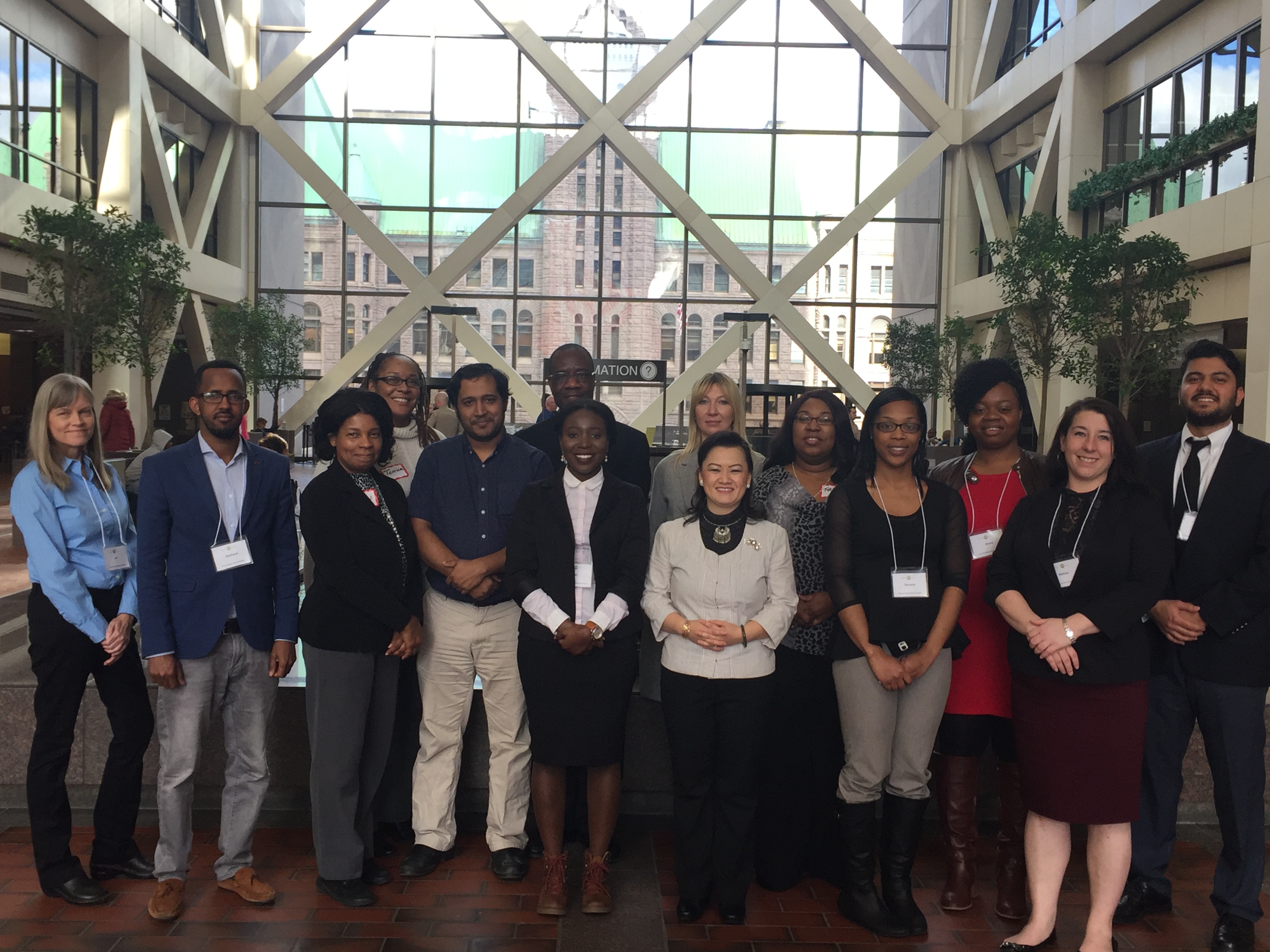Connecting state and local government leaders
In Minnesota, a training and hiring program is working on getting people into employment, including for the Hennepin County government.
Even with a historically low unemployment in most areas of the country, many people still struggle with finding jobs.
They lack the skills or educational background needed for the available openings and often have trouble getting to work or finding child care.
In Hennepin County, Minnesota, officials are trying to tackle this problem with training and employment programs that have two aims: lifting people out of poverty and creating a pipeline of qualified applicants for jobs the county needs to fill, in a tight labor market, as the Baby Boom generation retires. The goal is making both government and private sector work available to people who previously found themselves shut out of those opportunities.
So far, a study found that the county’s investment in program participants is paying off, in the form of lower claims on public aid programs.
Economic Drivers
By most measures, Minnesota’s economy is stronger than the other 18 states of the “heartland,” according to data compiled and just released by the Brookings Institution’s Metropolitan Policy Program and the Walton Family Foundation. Among people ages 20 to 64, 81.1 percent are working, a very strong employment-to-population ratio. The state’s 9.9 percent poverty rate is lower than in the other 18, and ranks as the fourth lowest in the nation, according to The State of the Heartland Factbook 2018.
But as in other states, that rosy picture doesn’t extend to everyone. Unemployment among black and Hispanic workers was more than twice the rate for white workers in September, according to the state Department of Employment and Economic Development.
Labor shortages are projected in the next five years, lending urgency to the task of preparing the relatively disadvantaged to fill jobs in the state’s metropolitan areas. Many will be minorities; despite Minnesota’s reputation for being “lily-white,” the state is rapidly becoming more diverse, scholar Jennifer Bradley wrote in a 2015 essay for the Brookings Institution. Unfortunately, she noted people of color haven’t been served particularly well by the state’s educational and training systems in the past.
The population of the twin cities of Minneapolis and St. Paul in 2015 was 78 percent white. However, minority residents increased three times as fast as whites from 1990 to 2010. And from 2010 to 2030, “the number of people of color is expected to grow twice as quickly as the number of whites,” Bradley wrote. Minneapolis is the county seat of Hennepin County, while St. Paul is the county seat of neighboring Ramsey County.
The area “is more diverse” than most areas, former Minneapolis Mayor R. T. Rybak told Bradley, since it has long been a hub for refugee resettlement. The region is home to many people who fled Southeast Asia and Africa and elsewhere—Mexicans, Hmong, Indians, Vietnamese, Somalis, Liberians and Ethiopians, all with their distinctive cultures and languages.
Children of immigrant parents, as well as those of African-Americans, lag behind whites in terms of academic achievement, statistics show. According to the Heartland Factbook, black and Hispanic attainment of college or advanced degrees trails that among the white population: respectively, 23.3 percent, 10.8 percent, and 36.4 percent. Similar gaps are found at lower levels of the educational ladder, among people who haven’t completed high school or college.
County Programs
About five years ago, Hennepin County Administrator David Hough’s staff came to realize that they would have to replace hundreds of employees who would be retiring in the next five years—between 2,500 and 3,000, according to the analysis then.
They set about devising new ways to filling some of these positions, while at the same time helping the hard-to-employ and boosting diversity in the county’s workforce.
The Hennepin County Pathways program was up and running by 2014. It focused initially on training people to be human services representatives, the employees who evaluate an applicant’s eligibility for social services provided by the county. The jobs paid about $18 per hour, plus benefits.
To organize and conduct the training, county officials turned to a nonprofit called Project for Pride in Living (PPL), which already ran programs to address workforce readiness and job skills for low-income people in Minneapolis and St. Paul. The county’s lead staffer on the project is Kari Boe-Schmidtz, a workforce development and staffing manager, and her counterpart at PPL is May Xiong, the nonprofit's vice president for employment readiness.
In interviews with Route Fifty, both stressed the value of the partnership their organizations have developed not only with each other but also with other providers of educational resources, including local colleges and nonprofits with such other specialties as working with people emerging from prison. And they also emphasized that these training programs, unlike many others, actually lead to permanent jobs.
The focus is on helping people whose incomes fall below 200 percent of the poverty line get a foothold in the world of steady work. Xiong said many are people of color who have high barriers to gaining steady employment, including difficulties with housing, child care and transportation. Quite a few are single parents.
Generally, people the program serves have earned at least a high school or GED degree. “Employers want that,” Xiong noted. But many, she added, need help to refresh competencies in math, reading and writing.

As time passed, the county expanded the list of occupations in its “Current Pathways” project, Boe-Schmidtz said. They now include 911 operators, building operations technicians, health care clerks, human services representatives, office specialists, and public works technicians. Would-be property tax appraisers can also apply for training positions.
And the county has developed a longer list of Pathways programs that it hopes will produce workers it can hire in such fields as forestry workers, police personnel, revenue examiners and commercially licensed drivers. It is also encouraging training in occupations for which it does not itself hire, such as baristas for coffee carts.
PPL prepares people for employment by the county in six of the occupations, working with local colleges to provide training targeted to individual jobs. Training schedules vary widely to accommodate people’s needs and ambitions.
Other nonprofits prepare people for different jobs the county fills; for example, Hired, originally started to help people who had been incarcerated, trains truck drivers and 911 operators.
Property appraisal offers one look into the county’s innovation. The occupation obviously requires soft skills to deal with property owners’ worries as appraisal inspectors enter their homes and businesses. And it also requires a fine eye for detail in examining the properties that are being evaluated. The county offers paid training positions that last one year and include free professional development classes, technical training in property appraisal, and courses to prepare trainees to take the Certified Minnesota Assessors exam. A YouTube video explains the occupation’s requirements.
Hennepin HR officials have sought to assess applicants’ credentials not simply by degrees earned, but also by life and prior work experience, putting the county in line with new research from the Urban Institute concluding that college education isn’t needed for many jobs now available in the economy.
Xiong is enthusiastic about the county’s initiatives. “What I love about the county is that it shares best practices, shares its thinking, helping other communities to replicate its approaches.”
Costs and Benefits
Hennepin County has kept careful track of its efforts to hire from low-income communities.
Data beginning in 2014 shows a steady increase in the number of people participating in the Pathways training programs and also in the number hired by the county itself. In the five years since the program began, the hiring of people of color by the county has steadily increased, from 43 percent of all hires in 2014 to 84 percent in 2018. Retention has also risen, from 43 percent in 2014 to 73 percent in 2017 and higher in the first three quarters of 2018.
In all, 630 people have participated in the Pathways programs since they began nearly five years ago, and 219 of them have been hired by Hennepin County.

They constitute a relatively small minority of Hennepin County’s efforts to fill its vacant positions. With a workforce of 9,100, the county hired 1,275 people in 2017, of whom 63 were from the Pathways programs, according to Boe-Schmidtz.
But the hiring programs are vital, says Human Resources director Michael Rossman, because of the entire Twin Cities region’s growing labor shortage. Over the next five years, the number of jobs needing filling in the region will exceed the number of traditionally qualified workers by 50,000 to 100,000, Rossman and his associates figure.
In an interview, Rossman said the “first and foremost” goal of the Hennepin County outreach program was to ensure that his workforce increasingly reflects the diversity of the urban populations it serves.
“You know, in the public sector, we have long applications processes, lots of hoops to get through. We want to remove the barriers, make it not so hard to get in the door, to get considered for a job,” he said. “People may be on some kind of public assistance, may have lost their way a little, or had life circumstances go against them.”
Considering life and work experience, instead of hewing strictly to academic and professional credentials, is one important step, Rossman said. One by one, Rossman’s staff has been examining the scores of occupational categories in which the county hires, seeking, he said, to make sure that each does not require more credentials than absolutely necessary. Simplification and combination of the job classifications has been a continuing goal, and the number of them is down from 450 a few years ago to 380 today.
The county government’s Center of Innovation and Excellence has undertaken a careful return-on-investment study of the Pathways programs. The study, released last January, followed the experience of 66 people who had been hired through the Pathways programs for jobs as human services representatives and office specialists.
On the cost side, the study gathered data about expenditures on training by nonprofit partners, and extra staff time needed to fully onboard these unconventional new hires, such as time devoted to shadowing existing workers in the two occupations. Office specialists averaged an investment by the county of $6,200, planning analysts Peter Bodurtha and Renee Van Siclen told Route Fifty in an interview. Investment in human services representatives averaged $5,300.
Retention rates were “pretty good,” for these hires, said Bodurtha, with 80 percent still on the job after 12 months. “And when they get jobs and keep them, their receipt of public assistance goes down dramatically,” he said. The study looked at public assistance from county, state and federal programs.
Once on staff, the new hires gain the full county benefits package, including access to a tuition reimbursement program that can contribute up to $5,250 a year toward the cost of continuing education that can lead to advancement and higher salaries.
Rossman said that other public jurisdictions, including neighboring Ramsey County, have been looking with interest at Hennepin County’s hiring programs, and that some had hired a few people trained in the Pathways programs.

And the programs are also of interest to major employers in the Twin Cities’ private sector. The county cosponsors a Workforce Leadership Council whose members include Wells Fargo, US Bank, Ameriprise, Allina Health, Fairview Health and others. Some of the private sector firms are hiring people trained in the Pathways programs, while others are just getting introduced to its purposes and methods, said Michael Davis II, who serves as Hennepin’s lead staffer for the council. Their involvement is “unique to each employer,” he continued. Some may share county officials’ desire to lift up the less-fortunate. Others may simply see the programs as meeting their staffing needs.
But all share one concern, Rossman observes: they are facing an extremely tight labor market and may need unconventional methods of finding, training, hiring and retaining people to remain competitive in their markets.
As for the people who do the work of helping the low-income people who yearn for a more solid footing in today’s economy, the rewards are in seeing their joy and pride in holding down a decent job with decent benefits.
“I have been in human resources work for 20 years,” said Boe-Schmidtz, “but have never before seen something so innovative, so life-changing. We are building the return-on-investment one person at a time. We are sending a message of hope: when I hear that someone has a new apartment, or now has a car, or has even bought a house, how rewarding that is.”
Timothy B. Clark is Editor at Large at Government Executive’s Route Fifty.

NEXT STORY: The Best Metro Areas for Commuting by Car




